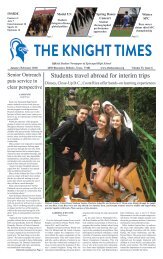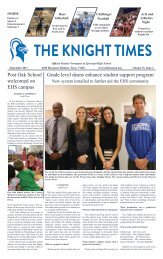THE KNIGHT TIMES - October 2017
Create successful ePaper yourself
Turn your PDF publications into a flip-book with our unique Google optimized e-Paper software.
14 The Knight Times<br />
Opinion<br />
Analyzing the outcomes of a growing online consumer market<br />
LAUREN PORTER<br />
Editor-in-Chief<br />
It is no surprise online shopping has become<br />
very popular in recent years. The<br />
convenience of obtaining any object at a<br />
click of a button is very appealing to most<br />
people. However, as many retailers are<br />
forced out of business by online competition,<br />
what price are we going to pay for<br />
the reliance on massive, powerful corporations?<br />
For example, look at the case of Amazon.<br />
Amazon sprung up as a great online<br />
site to find cheaper alternatives to retail<br />
items such as books. However, over the<br />
past year, Amazon has been stepping into<br />
the retail market, which can be frightening<br />
for smaller businesses. With Amazon’s<br />
recent acquisition of Whole Foods and the<br />
number of Amazon retail stores popping<br />
up across the country, Amazon has become<br />
engrained in the majority of Americans’<br />
lives.<br />
The Whole Foods purchase is a prime<br />
example of how major online corporations<br />
are invading the retail market. According<br />
to Business Insider, at select Whole Foods,<br />
the popular Amazon Echo will be sold,<br />
only furthering this major business’ presence<br />
in our lives. The Echo can do practically<br />
anything digital at your request, disabling<br />
the need for other devices.<br />
Point reward systems at Whole Foods<br />
are supposed to be in effect shortly to encourage<br />
more sales, and prices on items<br />
have already been reduced, as it has been<br />
one of the most expensive grocers in the<br />
past. Points for Amazon Prime members<br />
will also be available, which is meant to<br />
increase the total number of members.<br />
Whole Foods items will also be sold on the<br />
Amazon website, where one can purchase<br />
groceries directly online.<br />
With the development of incredibly fast<br />
shipping due to drones, it is entirely possible<br />
to see where the future of grocery shopping<br />
may be headed. The more dependent<br />
Amazon has recently opened retail spaces, which can be threatening to smaller businesses<br />
and the retail space in general. Photo courtesy of theverge.com.<br />
we become on big corporations instead of<br />
actually going outside to purchase goods,<br />
the fewer storefronts and small businesses<br />
there will be.<br />
With the overwhelming success of Amazon<br />
in the retail market, many other companies<br />
are trying to follow suit. Google<br />
is currently altering its brand as it transforms<br />
into more than just a search engine.<br />
As Google creates more products like the<br />
Google Home Mini, a device very similar<br />
to the Amazon Echo, it becomes a company<br />
designing for lifestyle and convenience.<br />
This shift from only being recognized as a<br />
search engine to a prominent tech company<br />
that produces phones and other gadgets<br />
proves the expansion of online businesses<br />
into the retail space.<br />
Even more frightening, Google has the<br />
capability to become even more powerful<br />
than Amazon. Google and Amazon similarly<br />
track what we buy online. The difference<br />
is the scale at which they can track<br />
it. Amazon, for the most part, is limited to<br />
the items a consumer buys from the site,<br />
and uses that information to suggest other<br />
products. Google, however, harbors information<br />
from all of the websites consumers<br />
search on the Google engine, and sells<br />
advertisements to them based on previous<br />
search history.<br />
Smaller retailers need to be aware of<br />
these growing powerhouses before the<br />
market is too competitive, and the profit<br />
margins of large corporations using offshore<br />
manufacturing become too great for<br />
smaller businesses to compete. I do not believe<br />
retail will ever completely disappear<br />
and the world will solely exist off of online<br />
business, however, it is entirely possible<br />
that the variety of retailers will become increasingly<br />
limited.<br />
Caffeine can be just as addictive as nicotine among teens<br />
CAMI PYNE<br />
Staff Writer<br />
Did you know that one of the most addictive<br />
drugs is completely legal for all ages<br />
to consume? You may have even partaken<br />
of this chemical before you came to class<br />
without even thinking about it. That morning<br />
cup of Joe has quite an impact on your<br />
brain.<br />
Caffeine, like other addictive chemicals,<br />
has the ability to rewire your brain to crave<br />
it, to need it to function, and can even trigger<br />
migraines. This intense concentrated<br />
psychoactive drug has almost all Americans<br />
under its spell.<br />
Apparently, coffee and caffeinated products<br />
keep most members of the EHS community<br />
on their toes, ready and alert; in a<br />
recent KT-survey, 80% of students that responded<br />
drink coffee or caffeinated products.<br />
About 21% of those students drink the<br />
products once a month, 20% once a week,<br />
18% enjoy caffeine 2-4 times a week, 10%<br />
about 4-6 times a week, 11% once a day,<br />
and 19% consume caffeine more often than<br />
that. These numbers suggest that caffeine<br />
use in its many forms is somewhat common<br />
among Episcopal students. Shockingly,<br />
30% of our student body says that they<br />
need a morning caffeine drink to function.<br />
The Episcopal student body has a shocking<br />
dependence on coffee and caffeinated<br />
beverages. Does it come with our culture?<br />
Is it the homework load or is it something<br />
else? I found that I didn’t start needing<br />
coffee until I was a junior, when I started<br />
taking harder classes and needed to stay up<br />
late to write essays and study while balancing<br />
my extracurriculars. Coffee became a<br />
means of staying alert and helped me function.<br />
Many people make this argument with<br />
nicotine addiction, that they can’t function<br />
without a buzz to calm them down.<br />
Nicotine works by constricting blood vessels<br />
and restricting the blood flow to the<br />
brain, giving the consumer a “buzz.” Coffee<br />
works by pumping blood faster through<br />
the body to the brain and gives the drinker<br />
bursts of energy.<br />
Generation Z, the present high schoolers’<br />
generation, was supposed to be the generation<br />
that stopped chemical addictions like<br />
the dependence on coffee. Instead, we have<br />
24%<br />
20%<br />
16%<br />
12%<br />
8%<br />
4%<br />
0<br />
Once a<br />
month<br />
Once a<br />
week<br />
become overworked while attempting to<br />
keep up with rigorous extracurriculars and<br />
attaining scores worthy of colleges. Coffee<br />
has become a convenient necessity.<br />
2-4 times<br />
a week<br />
4-6 times<br />
a week<br />
Caffeinated products, whether coffee,<br />
soda, or energy drinks, have become a<br />
common option for many teens. It may be<br />
time to step back and reconsider.<br />
COFFEE CONSUMPTION FREQUENCY AMONG EHS STUDENTS<br />
Once a<br />
day<br />
More than<br />
once a day<br />
Eighty percent of the EHS student body indicated on a recent Episco-poll that they drink coffee. Above is a drink down of that<br />
frequency of consumption.

















